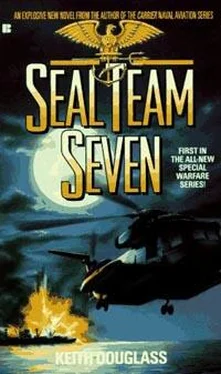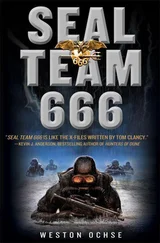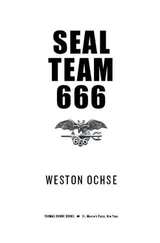Keith Douglass - Seal Team Seven
Здесь есть возможность читать онлайн «Keith Douglass - Seal Team Seven» весь текст электронной книги совершенно бесплатно (целиком полную версию без сокращений). В некоторых случаях можно слушать аудио, скачать через торрент в формате fb2 и присутствует краткое содержание. Жанр: Боевик, на английском языке. Описание произведения, (предисловие) а так же отзывы посетителей доступны на портале библиотеки ЛибКат.
- Название:Seal Team Seven
- Автор:
- Жанр:
- Год:неизвестен
- ISBN:нет данных
- Рейтинг книги:3 / 5. Голосов: 1
-
Избранное:Добавить в избранное
- Отзывы:
-
Ваша оценка:
- 60
- 1
- 2
- 3
- 4
- 5
Seal Team Seven: краткое содержание, описание и аннотация
Предлагаем к чтению аннотацию, описание, краткое содержание или предисловие (зависит от того, что написал сам автор книги «Seal Team Seven»). Если вы не нашли необходимую информацию о книге — напишите в комментариях, мы постараемся отыскать её.
Their cargo includes two tons of weapons-grade plutonium. And now, with enough nuke fuel to arm a superpower, an alliance of fanatics threatens to poison a continent.
In a daring mission of high-seas heroism, Lt. Blake Murdock leads his seven-man unit from Team Seven's Red Squad into bulkhead-to-bulkhead battle — with high-tech
buccaneers who've got nothing left to lose...
Seal Team Seven — читать онлайн бесплатно полную книгу (весь текст) целиком
Ниже представлен текст книги, разбитый по страницам. Система сохранения места последней прочитанной страницы, позволяет с удобством читать онлайн бесплатно книгу «Seal Team Seven», без необходимости каждый раз заново искать на чём Вы остановились. Поставьте закладку, и сможете в любой момент перейти на страницу, на которой закончили чтение.
Интервал:
Закладка:
"So the Iranians rendezvoused with them?" DeWitt added.
"Actually, we don't know that for sure. If they did rendezvous, it was at a point where we had no satellite coverage, and our AWACS radar simply didn't have the resolution to be certain. They at least came very close, certainly within a mile or two. Hormuz is now five miles off Yuduki Maru's starboard beam, traveling parallel to her course but quickly falling behind. She can only make nine or ten knots, top speed."
"I guess that confirms the Iranian connection, though, doesn't it, Lieutenant?" DeWitt said.
"I damn well guess it does." Murdock tapped the sheet in the photograph. "What's this? A tarp?"
"Probably," Halleck said, rubbing his chin. "A tarp or canvas rigged as an awning. Whatever they're doing, they don't want our satellites or recon planes to get a good look."
"The question, then, is whether they used that hole in our satellite coverage to transfer part of Yuduki Maru's cargo to the Hormuz."
"Or if they moved soldiers from the Hormuz to the Yuduki Maru," DeWitt pointed out.
"We'll have to assume both," Murdock decided. "It'll be Plan Alfa." In their planning sessions, they'd allowed for the possibility that Hormuz might rendezvous with the plutonium freighter before the SEALs could deploy. Plan Bravo would have sent Blue Squad aboard the Yuduki Maru, with Gold Squad waiting in their CRRCs as a backup. Alfa called for Blue to take the Japanese ship while Gold Squad boarded the Iranian Hormuz. It meant there would be no immediate backup for either team once they boarded the ships. The Fourth Platoon was now deploying to Masirah, just in case something went wrong in Third Platoon's assault.
Murdock suppressed the thought, and the surge of adrenaline that accompanied it. If something went wrong, the mission would be in the hands of Lieutenant Mancuso and Fourth Platoon.
It also meant that, in all likelihood, he and his teammates would be dead.
"We have one other joker in the deck," Halleck said. "Sonar has picked up another contact pacing the Yuduki Maru. It may be submerged."
"The Iranian Kilo."
"Looks that way. The sonar profile looks like a conventional sub. Stealthy, no reactor coolant pump noise or anything like that. She may be trailing the plutonium ship by another four or five miles."
"Have they heard us?"
"Not so far as we can tell. There's been no change in her course or speed since we picked her up."
"How big a problem is she for you, Captain?"
Halleck grimaced, then shrugged. "For us, not much. The big danger is whether she's there as escort, or as insurance."
"What do you mean, Captain?" DeWitt asked.
"He means that if we board the Yuduki Maru and take down the tangos before she reaches port, the Iranians might decide to put a fish into her."
"That's about the size of it," Bagley said. "Washington would have the devil of a time proving the ship hadn't been blown up by us, on purpose or by accident."
"And we get blamed for contaminating half the African coast," DeWitt said. "Cute."
"Will you be able to take her out?" Murdock asked.
"We won't, no," Halleck replied. "Not without letting those people aboard the freighter know we're out here. But the Newport News is already getting into position. They'll take care of the Kilo when you go aboard."
"Good." Murdock nodded. "How much longer to drop-off?"
Halleck consulted the large clock mounted on the bulkhead at the forward end of the control room. "I'd say another twenty minutes to get into position. We'll keep running ahead of them then, and you can leave any time after that."
"Can't be too much longer, or the separation between Hormuz and the Yuduki Maru will become too great. We'd better get ready to swim then. If you'll excuse us, Captain?"
"Of course."
The platoon had been preparing for their swim for the past several hours, going over their rebreather apparatus, weapons, and other gear with the loving care and attention that had long been the hallmark of the SEALS. Each man was wearing a black wet suit and SCUBA gear, and his face had been completely blackened with waterproof paint. Weapons had been sealed, and explosive charges and detonators were stored in waterproof pouches. While they didn't want to sink either of the target ships, the theory was that if they couldn't capture them, the SEALs might at least slow them by damaging some critical piece of machinery.
That, at least, was the idea. The gap between theory and practice, however, was often turned into a yawning abyss by Murphy's Law. All the SEALs could do was try to be prepared for anything that might go wrong... and stay flexible enough to meet the problems they simply could not anticipate.
There are several ways to egress a submarine. Simplest would have been for Halleck to bring the Santa Fe up until just the top of her sail was above water, with the SEALs going out through the sail cockpit. Yuduki Maru had radar, however, and it was possible that even so small a target as that would be picked up at a range of less than ten miles, so the platoon egressed, as planned, through the after lockout compartment.
Because of the positioning of their water intakes, modern submarines cannot rest on the bottom as their World War II predecessors could. Besides, the ocean here was deep; they were over the Somali Basin, which plunged to better than five thousand meters — over three miles straight down. The Santa Fe, now traveling north some eight miles ahead of the Yuduki Maru and about ten miles ahead of the Hormuz, slowed to a crawl, maintaining just speed enough to maintain way, her conning tower scraping along just beneath the surface.
Two by two, because the chamber was too small for more, the men of SEAL Seven, Third Platoon, began locking out of the escape trunk. Murdock was last out, giving each man's gear a final check before he climbed the ladder into the narrow cylinder that was a floodable extension of the sub's pressure hull. He went out with MacKenzie, squeezing into the chamber opposite the big Texan and using the intercom, called a 31-MC, to alert the sub's crew that they were ready to go. Turning a valve flooded the chamber; when the water was above the side door, they pushed it open, emerging in a recess in the Santa Fe's afterdeck. The other twelve men had already broken out the gear that had been stored there after their paradrop; four Combat Rubber Raiding Craft from the C-130's pallet canister had been rolled up, lashed together, and stowed in the deck compartment between the sub's outer and pressure hulls, along with the boat's engines and other necessary gear.
They worked swiftly and surely, in an almost total, inky darkness penetrated only incompletely by the small lights the men carried. Both the Santa Fe and the SEALs were still moving slowly forward, and the water pressure as the current boiled aft past the sail was like a stiff wind. Air bubbles tinkled and burbled in the darkness as they rose from SCUBA regulators. SCUBA gear was being used for this mission rather than rebreathers because the final approach would be on the surface, rather than underwater, and there would be no danger of the bubbles giving away the divers' positions.
In moments, the CRRCs were freed and inflated from pressure bottles, rising to the surface accompanied by their retinue of frogmen. Their lights were extinguished as they rode the rubber rafts toward the surface. In minutes, the four rafts were bobbing on a gentle swell on the surface. Stars peeped from among scattered clouds overhead. The horizon, visible only where the stars ended, was empty.
The SEALs rolled aboard their CRRCs and began unshipping the engines and securing their gear. SCUBA tanks, masks, and flippers were removed and stowed. Flak jackets and combat harnesses went on over wet-suit tops; radio headsets were slipped into place and plugged into belt Motorola units. They wore the SEALs' usual mix of headgear: floppy boonie hats, woolen balaclavas, or a dark green scarf folded into a triangle and worn over the head like a bandana. Under their swim fins, they wore thick-soled, rubber-cleated boots, specially designed footwear for climbing slippery steel. No words were spoken during the entire process, and radio silence was strictly observed save for the brief clicks of the necessary radio checks; each movement, each act had been practiced countless times by every man in the team. A hand signal, barely visible in the night, a thumbs-up, and the two sets of rafts began drawing apart, propelled by silenced engines that gave off little noise above a soft purr. The plan called for them to split into two groups of two, Murdock's group heading due South to intercept the Yuduki Maru, DeWitt's squad bearing to the southeast to close with the more distant Hormuz.
Читать дальшеИнтервал:
Закладка:
Похожие книги на «Seal Team Seven»
Представляем Вашему вниманию похожие книги на «Seal Team Seven» списком для выбора. Мы отобрали схожую по названию и смыслу литературу в надежде предоставить читателям больше вариантов отыскать новые, интересные, ещё непрочитанные произведения.
Обсуждение, отзывы о книге «Seal Team Seven» и просто собственные мнения читателей. Оставьте ваши комментарии, напишите, что Вы думаете о произведении, его смысле или главных героях. Укажите что конкретно понравилось, а что нет, и почему Вы так считаете.












